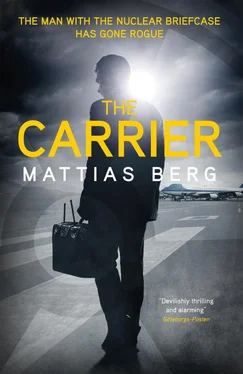Mattias Berg - The Carrier
Здесь есть возможность читать онлайн «Mattias Berg - The Carrier» весь текст электронной книги совершенно бесплатно (целиком полную версию без сокращений). В некоторых случаях можно слушать аудио, скачать через торрент в формате fb2 и присутствует краткое содержание. Город: London, Год выпуска: 2019, ISBN: 2019, Издательство: MacLehose Press, Жанр: Триллер, на английском языке. Описание произведения, (предисловие) а так же отзывы посетителей доступны на портале библиотеки ЛибКат.
- Название:The Carrier
- Автор:
- Издательство:MacLehose Press
- Жанр:
- Год:2019
- Город:London
- ISBN:978-0-85705-788-4
- Рейтинг книги:4 / 5. Голосов: 1
-
Избранное:Добавить в избранное
- Отзывы:
-
Ваша оценка:
- 80
- 1
- 2
- 3
- 4
- 5
The Carrier: краткое содержание, описание и аннотация
Предлагаем к чтению аннотацию, описание, краткое содержание или предисловие (зависит от того, что написал сам автор книги «The Carrier»). Если вы не нашли необходимую информацию о книге — напишите в комментариях, мы постараемся отыскать её.
The Carrier — читать онлайн бесплатно полную книгу (весь текст) целиком
Ниже представлен текст книги, разбитый по страницам. Система сохранения места последней прочитанной страницы, позволяет с удобством читать онлайн бесплатно книгу «The Carrier», без необходимости каждый раз заново искать на чём Вы остановились. Поставьте закладку, и сможете в любой момент перейти на страницу, на которой закончили чтение.
Интервал:
Закладка:
Then it did not take many minutes before we were out on the main road, taking the narrowest streets through the sleeping town. Not a soul anywhere, not the smallest light in any of the cottages. Just snow, the drifts, the thick forest reasserting its mastery as soon as we left the enchanting little wooden quarter behind. The mountain of doom which hung brooding over the area. Through the silence of the night I thought I could hear the town cracking up inch by inch.
The mine gave and the mine took away, as Ingrid had said. In many ways it was the only thing capable of supporting life up here. Yet she said that there were also many who had high hopes for Esrange. For space tourism, Virgin Galactic, Spaceport Sweden. During weekends and holidays, the Swedish Space Bureau’s megaphones blared about free ice cream and movies in Folkets Hus, the People’s House.
The freezing air fizzed in my nose, which I kept free of my balaclava so I could breathe more easily. The extreme cold had returned after a brief pause: a thermometer decorated with neon reindeer on the front of a house showed closer to negative forty, even though the Arctic nights were more than a month away. On December 10, the sun would disappear below the horizon for three endless weeks.
The computer had shown the distance to be almost exactly the length of a marathon, just under 26 miles. We kept up a suitable speed, about seven minutes per mile, despite the hybrid slowing me down by about 10 per cent. It meant that we ought to be at Esrange at 05.30 at the latest, before the night shift finished, according to Ingrid’s information—and with strength remaining for the assignment itself. We could then reasonably be back at the hotel before they cleared away breakfast.
Ingrid ran with a free and springy step, kept up her pace, hips straight and upright, all the way until we stopped a mile or so from the installation. Saw the characteristic light in the sky: the reflection of the searchlights was always at least as revealing as the satellite dishes. At that point we turned off straight east into the forest. The snow was lying feet deep, Ingrid measured the weight of her steps exactly right, not breaking through the frozen crust.
Although we had never once trained together, every one of our movements was synchronized. Ingrid must have carried out similar assignments for decades before my own training began. We stole forward toward the seemingly unmanned north-east gate, the moon remaining behind the clouds. It would not be easy for anyone to spot us through this barely half-open terrain. When we reached the gates, I memorized the co-ordinates: E.S.-1219-V. While Ingrid got to work on the code lock, the security system itself, I stood in the dead angle of the surveillance cameras and kept watch, my weapon drawn under my non-reflective black running jacket.
The seconds passed extremely slowly, as they do at times like this—before there was a click from the lock. The upper red lamp lit up for a moment, but by the time we ran through the gates Ingrid had managed to short-circuit the security system. It was silent and excruciatingly cold all around. Our slip-on boot spikes were light-weight and flexible, designed not to betray our steps, no matter what the surface.
And it is hard for an outsider to understand how easy it is to break into an installation, even if it is guarded around the clock. How quickly human psychology falls victim to routine.
Even after years of training, long theoretical rehearsals of security measures, it is different in practice. Card games get in the way, or intense discussions in the middle of the night while sitting in front of screens—about money for the children’s education, the latest baseball games, maybe an imminent divorce, sicknesses and deaths. The inevitable result is brief periods of inattention.
After lengthy searches through his enormous database, Edelweiss had concluded that those periods were generally between 8 and 29 seconds long. “One never has more than half a minute,” he said. “But with the right training, that’s oceans of time.”
Which is why we now moved in quick intervals, randomly interspaced, before finding a new camera shadow and waiting for a few minutes. All the while I expected us to be discovered. Because there is no way of knowing when the periods of inattention occur: at any moment we could run into a couple of sleepy guards. Or maybe some super-professionals called in from N.E.A.T., the world’s largest military training ground, just minutes away by car, in response to an alarm being triggered.
And it had been so long since the adrenaline last pumped through my body in this way. I enjoyed that feeling of being on edge, the watchfulness even while moving at top speed. How this natural drug made me reckless and incredibly strong.
Ingrid was in the lead, I followed her light steps. We passed through some interior doors with unexpected ease. Despite the strategic importance of the center—the other evening, Ingrid had said, Swedish television news revealed that Esrange had made possible our latest spy satellite over the Middle East—the security personnel here too seemed to be neglecting some of their routines. After all these years without incident it was so easy to ignore, or simply forget, to seal all doors fully in accordance with regulations.
Edelweiss had compared it to brushing one’s teeth: if you begin to neglect one single ritual, others will soon follow. He would therefore sometimes ask us to breathe on him, even in the most tense situations. In his book bad breath justified as hard a punishment as more concrete breaches of regulations.
Most surveillance centers were also wrongly built from the start, something one only noticed if one thought offensively—like an attacker, not a defender. The guards would look out into the night, toward the gates, up into space, at all their screens. But rarely right behind their backs.
“I’m ready,” Ingrid whispered only a few feet from the control board. Her skeletal face turning toward my devil’s mask and the guards still with their backs to us.
“Are you, Erasmus?”
I nodded—and in the next moment she dashed toward the hard discs, the storage center for all the launch footage the satellites sent streaming down, while I took care of both guards more or less at the same time. I pressed lightly on the soft spots behind the ears of the first one and his chin immediately sunk onto his chest, as if he had fallen asleep at his post. The second one just had time to defend himself. As he raised his hands to his head, to protect against direct blows from behind, I pinned them together and thumped his head lightly onto the control board. It does not take much to knock somebody out.
After a few minutes, Ingrid stuck the U.S.B. into her jacket and we set off at top speed in the direction we had come. When other guards appeared with drawn weapons from a sliding door in the wall, we both stopped in mid-movement. It was Ingrid they wanted: they hardly looked at me. I stood stock-still, registering the scene around me. The flashing bright red lights, two heavily armed special guards, the alarm pumping straight into my brain.
Edelweiss had preached that no human being can know exactly how he will react in the most critical situations. An entire life of training can’t make us absolutely sure of ourselves. “Not even you, Erasmus,” he had said. “Not even me.”
Yet it did not take many seconds before I knew. The guards who just before had seemed so invincible, beasts straight up from the underworld with their automatic weapons pointed at Ingrid’s temples, were now more like two pitiful small beings in a terrifying medieval painting out of one of her lectures. It could have been Caravaggio, Bosch, or maybe Bruegel’s eternal struggle between heaven and hell.
Читать дальшеИнтервал:
Закладка:
Похожие книги на «The Carrier»
Представляем Вашему вниманию похожие книги на «The Carrier» списком для выбора. Мы отобрали схожую по названию и смыслу литературу в надежде предоставить читателям больше вариантов отыскать новые, интересные, ещё непрочитанные произведения.
Обсуждение, отзывы о книге «The Carrier» и просто собственные мнения читателей. Оставьте ваши комментарии, напишите, что Вы думаете о произведении, его смысле или главных героях. Укажите что конкретно понравилось, а что нет, и почему Вы так считаете.












